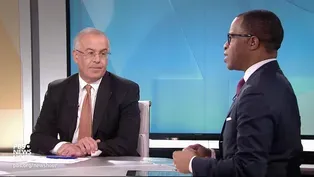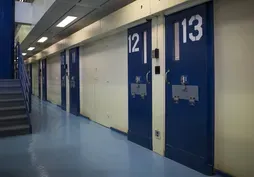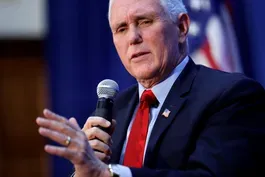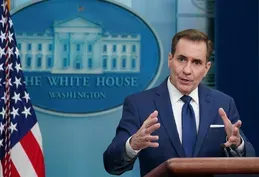
Turkey, Syria earthquake death toll nears 24,000
Clip: 2/10/2023 | 6m 43sVideo has Closed Captions
Aid reaches remote regions in Turkey and Syria as earthquake death toll nears 24,000
Six days have passed since a catastrophic earthquake struck the Turkish-Syrian border region and nearly 24,000 people are confirmed dead. The focus is shifting to aiding the survivors in Turkey and the Idlib Province in Syria, but there have also been moments of people pulled alive from the ruins. Jane Ferguson reports from near the epicenter in southern Turkey, where little is left standing.
Problems with Closed Captions? Closed Captioning Feedback
Problems with Closed Captions? Closed Captioning Feedback
Major corporate funding for the PBS News Hour is provided by BDO, BNSF, Consumer Cellular, American Cruise Lines, and Raymond James. Funding for the PBS NewsHour Weekend is provided by...

Turkey, Syria earthquake death toll nears 24,000
Clip: 2/10/2023 | 6m 43sVideo has Closed Captions
Six days have passed since a catastrophic earthquake struck the Turkish-Syrian border region and nearly 24,000 people are confirmed dead. The focus is shifting to aiding the survivors in Turkey and the Idlib Province in Syria, but there have also been moments of people pulled alive from the ruins. Jane Ferguson reports from near the epicenter in southern Turkey, where little is left standing.
Problems with Closed Captions? Closed Captioning Feedback
How to Watch PBS News Hour
PBS News Hour is available to stream on pbs.org and the free PBS App, available on iPhone, Apple TV, Android TV, Android smartphones, Amazon Fire TV, Amazon Fire Tablet, Roku, Samsung Smart TV, and Vizio.
Providing Support for PBS.org
Learn Moreabout PBS online sponsorshipAMNA NAWAZ: Now to the earthquake that devastated Southern Turkey and Northern Syria.
The toll of the dead keeps climbing, but there have also been dramatic moments today of people pulled alive from the ruins.
Jane Ferguson reports from near the quake's epicenter in Turkey, where little is left standing.
JANE FERGUSON: It hardly seems possible, but five days after the earthquake, some people are still alive under the wreckage.
The noises are growing quieter.
These Spanish and Turkish rescue workers have heard what sounds like someone deep inside debris banging against the rocks.
Reaching them is painstaking and dangerous.
Scenes like this are increasingly rare, however.
At the neighbor's house, the body of a newborn baby was born, its tiny frame wrapped in a blanket and placed on the sidewalk.
A few streets over, a dead man's body is recovered in front of his family.
People are being pulled out of the rubble here still, but many of them are simply not alive anymore.
Family members who have been waiting for a long time watching the rescue efforts finally have the devastating confirmation that their loved ones are not coming out from under the rubble alive.
Kahramanamaras city is close to the epicenter of the earthquake, and the devastation is everywhere.
We found 19-year-old Murat Geceyatar sitting on a bench next to a massive pile of rubble.
Underneath, his best friend and older brother, Irfan, lays dead.
You're not able to personally dig through the rubble yourself.
But you still sit here and wait.
What does it mean to you personally to be this close?
MURAT GECEYATAR, Turkish Earthquake Survivor (through translator): I think my brother is under a main column, and that's why we couldn't find him.
We found my nephew's body, and I pulled it out with my own hands.
I have been here for five days.
The desperation is killing people.
It is killing me.
You know they are in there, but you cannot do anything.
Bare hands are not enough.
JANE FERGUSON: In other areas of Turkey, moments of grace.
In Diyarbakir, more than 200 miles from the epicenter, a mother and her son were buried under ruins for over 100 hours.
As they were carried to ambulances, rescuers took a brief moment to rejoice.
SEHMUZ CEVIK, Turkish Rescue Worker (through translator): It's an incredible moment.
We started giving warnings, like: "Is anyone there?
Is anyone hearing my voice?"
For a moment, I thought the voices of the survivors were coming from my mind.
JANE FERGUSON: Babies and young children are still being discovered alive too.
But, as hours pass, hope dwindles for the thousands waiting for word of their missing loved ones.
Meanwhile, Turkish President Tayyip Erdogan is continuing his tours of the destruction.
Today, in Adiyaman, he visited an aid hub swarming with people whose town was leveled by the quake.
RECEP TAYYIP ERDOGAN, Turkish President (through translator): I know very well that words are not enough to describe the pain we are going through.
JANE FERGUSON: Criticism over lax government assistance has been unceasing.
The slow response leads to desperation in tent cities like this one, where many Syrian refugees are living.
RABIE AL-FAHAD, Syrian Earthquake Survivor (through translator): I'm not sleeping at night trying to provide for my kids.
When the aid car shows up, 1,000 people in need rush to it.
NASER AL-WAKAA, Syrian Earthquake Survivor (through translator): (through translator): This notice from Heba.
This is Heba, my eldest daughter who died.
God help me.
She's gone.
My God.
JANE FERGUSON: Across the border in Syria, a father clutched onto the tiny clothes of his dead children.
Naser Al-Wakaa sat in the ruins of his destroyed home in Jindaris, west of Aleppo.
Three of his children were rescued, but he lost his wife and six other children.
NASER AL-WAKAA (through translator): We are used to airstrikes.
We are used to rockets, to barrel bombs.
This is normal to us, but an earthquake, it's a God act.
This is the first time this happens with us.
JANE FERGUSON: For over a decade, Syrians like him have suffered a brutal civil war.
Yesterday, the first U.N. convoy of 14 trucks made its way into rebel-held Idlib province.
Mazen Alloush, the director of relations at the border crossing, said the U.N. had promised more aid.
MAZEN ALLOUSH, Border Crossing Director of Relations (through translator): What we have heard from OCHA, the U.N. and from Turkey is that these trucks are just an initial response and will hopefully be followed by larger and more numerous loads of supplies.
CHARLES LISTER, Middle East Institute: It's become increasingly clear that the main challenge as far as the U.N. is concerned is its desire not to rock the boat in Damascus with the Syrian regime.
JANE FERGUSON: Charles Lister is a senior fellow at the Middle East Institute, a think tank.
He says, after the earthquake, Syria was willing to see aid delivered only through Damascus and not through the U.N.-approved border crossing from Turkey.
CHARLES LISTER: While the regime says that it would like and is happy to provide cross-line assistance to all Syrians, including opposition areas, its track record of doing so is appalling.
JANE FERGUSON: Back in Kahramanamaras in Turkey, some look around and wonder why the destruction has been so widespread.
Murat believes the building his brother and nephew died in was, like many others here, unsafe for a quake zone.
MURAT GECEYATAR (through translator): It's not only this building.
In Kahramanamaras, many new buildings had crashed before people even moved in.
Many buildings had cracks.
Many buildings collapsed.
We are not only killed by the earthquake.
We are killed by poor safety standards.
JANE FERGUSON: The number of new buildings that came down in the earthquake has raised questions about their building standards.
President Erdogan's government has overseen a massive expansion in housing development and construction in recent years.
Questions over the quality of those buildings grow louder.
MURAT GECEYATAR (through translator): We have a fault line through our country and experts giving warnings many times that we didn't have any building precautions.
And then this has happened, causing so much despair.
In the future, we must be thinking of the next disaster.
Our government and people should be more sensitive about this issue.
JANE FERGUSON: The rapidly rising death toll has shocked many here.
As the country continues to reel from this catastrophe, millions pray the numbers stop growing.
For the "PBS NewsHour," I'm Jane Ferguson in Kahramanamaras, Turkey.
Brooks and Capehart on Biden getting his message out
Video has Closed Captions
Clip: 2/10/2023 | 10m 31s | Brooks and Capehart on Biden getting his message out, GOP primary poll (10m 31s)
Cracking down on sex trafficking in AZ ahead of Super Bowl
Video has Closed Captions
Clip: 2/10/2023 | 5m 24s | The efforts to crack down on sex trafficking in Arizona ahead of Super Bowl (5m 24s)
House Republicans take steps to block new D.C. criminal code
Video has Closed Captions
Clip: 2/10/2023 | 7m 40s | House Republicans take steps to block new criminal code in Washington, D.C. (7m 40s)
Newspapers collaborate to finish work of murdered reporter
Video has Closed Captions
Clip: 2/10/2023 | 8m 3s | Two newspapers collaborate to finish work of murdered investigative reporter (8m 3s)
Pence subpoenaed by special counsel investigating Trump
Video has Closed Captions
Clip: 2/10/2023 | 4m 50s | Pence subpoenaed by special counsel investigating Trump's efforts to overturn election (4m 50s)
U.S. shoots down object that flew into airspace near Alaska
Video has Closed Captions
Clip: 2/10/2023 | 3m 5s | U.S. shoots down object that crossed into airspace near Alaska (3m 5s)
Providing Support for PBS.org
Learn Moreabout PBS online sponsorshipSupport for PBS provided by:
Major corporate funding for the PBS News Hour is provided by BDO, BNSF, Consumer Cellular, American Cruise Lines, and Raymond James. Funding for the PBS NewsHour Weekend is provided by...
















